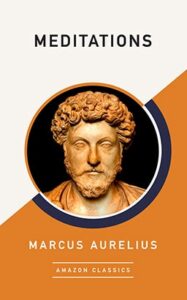‘Meditations’ is a collection of personal writings by the Stoic philosopher and Roman Emperor, Marcus Aurelius, who lived almost 2,000 years ago.
Despite Marcus Aurelius’ power and wealth, he lived a simple and disciplined life, and his book reflects a strong belief in Stoicism. Written in the form of personal meditations, the book offers great insights into the nature of human existence and the importance of living in accordance with reason, virtue, and nature.
Before diving into the book’s key ideas, it is worth pointing out that Meditations was written against the backdrop of many significant challenges that Marcus Aurelius faced, including:
- Military campaigns: Marcus Aurelius had to lead the Roman army in several campaigns against invading tribes along the northern borders of the Roman Empire. The Marcomannic Wars were some of the most prolonged and difficult conflicts of his reign, and they required significant resources and strategic planning.
- Rebellions within the empire: There were multiple threats from various rebellious governors and military commanders who challenged Marcus Aurelius’ authority, particularly in the eastern part of the empire. However, he was generally able to maintain control over the empire and put down these rebellions, thanks in part to his strong leadership skills and the loyalty of the Roman army.
- Political instability: The empire that Marcus Aurelius inherited had experienced political instability and corruption, and he had to work hard to address these issues. He implemented administrative and legal reforms to make the government more efficient and fair, and he tried to root out corruption wherever he found it.
- Plagues: In 165 AD, the Antonine Plague broke out, which is believed to have been caused by smallpox or measles. The epidemic lasted for several years and is estimated to have killed millions of people throughout the Roman Empire, including soldiers in Marcus Aurelius’s army. The outbreak weakened the empire and made it more vulnerable to attacks by outside enemies
- Economic challenges: The Roman Empire faced several economic challenges during Marcus Aurelius’s reign, including inflation, food shortages, and disruptions in trade. He had to work hard to stabilise the economy and ensure that people had access to food and other necessities.
- Health problems: Marcus Aurelius suffered from various health problems throughout his life, including chronic stomach issues, headaches, and possibly even glaucoma. These health problems may have made it more difficult for him to carry out his duties as emperor.
- Personal grief: One of the most significant losses he faced was that of his wife, Faustina the Younger. She died in 175 AD while travelling with Marcus Aurelius on a military campaign in the east. Her death was a great personal tragedy for Marcus, as they had been married for over 20 years and had several children together.
Given this background, I find Marcus Aurelius to be a fascinating historical figure to study – in which his writings in ‘Meditations’ are both inspirational and practical.
In this blog post, I explore, using quotes from the book, the key themes of ‘Meditations’ and how they can be applied to our lives today.
Key Idea 1 – Everything that happens in the universe is considered to be part of its grand plan.
Logos, a Greek concept that means “reason,” was a central aspect of ancient philosophical teachings across various subjects, including nature and human action. Accordingly, Logos permeates everything in the universe, giving it form and order.
For Marcus Aurelius, everything that happened in the world had a purpose and was part of a larger plan. He therefore believed that people should strive to live in accordance with this natural order, and that by doing so, they would be living a good and fulfilling life.
In practical terms, this belief can be extremely helpful as a way of accepting others the way they are. This does not mean that you need to vindicate vexatious or malicious behaviour, for example. What it does mean is that you can view the poor behaviour of others within the context of a diverse creation – in which it is both unnecessary and actually counterproductive to harbour negative feelings such as hatred towards others.
The following quotes encapsulate this idea well:
That men of a certain type should behave as they do is inevitable. To wish it otherwise were to wish the fig-tree would not yield its juice. In any case, remember that in a very little while both you and he will be dead, and your very names will quickly be forgotten.
…
Neither can I be angry with my brother or fall foul of him; for he and I were born to work together, like a man’s two hands, feet, or eyelids, or like the upper and lower rows of his teeth. To obstruct each other is against Nature’s law – and what is irritation or aversion but a form of obstruction?
…
Everything that happens is as normal and expected as the spring rose or the summer fruit; this is true of sickness, death, slander, intrigue, and all the other things that delight or trouble foolish men.
…
When an opponent in the gymnasium gashes us with his nails or bruises our head in a collision, we do not protest or take offence, and we do not suspect him ever afterwards of malicious intent. However, we do regard him with a wary eye; not in enmity or suspicion, yet good-temperedly keeping our distance. So let it be, too, at other times in life; let us agree to overlook a great many things in those who are, as it were, our fellow-contestants. A simple avoidance, as I have said, is always open to us, without either suspicion or ill will.
Personally, I have this aspect of Stoic philosophy to be incredibly empowering – especially when dealing with difficult people. Simply by accepting others the way they are, as part of the diverse tapestry of life, I am able to feel far greater levels of equanimity and self-control. It is in this state that Marcus Aurelius would refer to as living in accordance with the natural order, which in fact actually enables me to have greater influence over my own life – as well as the decisions of others.
Key Idea 2 – The inevitability of death means that it should not be feared and time should be used responsibly.
Marcus Aurelius believed that death is simply a natural part of life, and it only brings an end to the physical body. He maintained that a person’s soul, or their essential being, continues to exist beyond the physical realm. Therefore, it is pointless to fear death, and one should focus on living a fulfilling life instead:
Observe, in short, how transient and trivial is all mortal life; yesterday a drop of semen, tomorrow a handful of spice or ashes. Spend, therefore, these fleeting moments on earth as Nature would have you spend them, and then go to your rest with a good grace, as an olive falls in its season, with a blessing for the earth that bore it and a thanksgiving to the tree that gave it life.
Guard also against another kind of error: the folly of those who weary their days in much business, but lack any aim on which their whole effort, nay, their whole thought, is focused.
For even if a man’s years be prolonged, we must still take into account that it is doubtful whether his mind will continue to retain its capacity for the understanding of business, or for the contemplative effort needed to apprehend things divine and human.
Keep before your eyes the swift onset of oblivion, and the abysses of eternity before us and behind; mark how hollow are the echoes of applause, how fickle and undiscerning the judgements of professed admirers, and how puny the arena of human fame.
The transience of life is a recurring theme in Meditations. Marcus Aurelius recognised that life is fleeting and that we are all subject to the inevitability of death. He believed that by accepting the impermanence of life, we can cultivate a deeper appreciation for the present moment and focus on what truly matters in our lives. By accepting the transience of life and focusing on the present moment, we can cultivate a sense of mindfulness that can help us to reduce stress and anxiety and improve our overall well-being.
Key Idea 3 – Don’t waste your limited time on earth by complaining.
To make the most of our limited time on earth, it is important not to waste it complaining about the difficulties of life. Marcus Aurelius believed in fulfilling his responsibilities without complaint:
Do not waste what remains of your life in speculating about your neighbours, unless with a view to some mutual benefit. To wonder what so-and-so is doing and why, or what he is saying, or thinking, or scheming – in a word, anything that distracts you from fidelity to the Ruler within you – means a loss of opportunity for some other task.
…
One whose chief regard is for his own mind, and for the divinity within him and the service of its goodness, will strike no poses, utter no complaints, and crave neither for solitude nor yet for a crowd. Best of all, his life will be free from continual pursuings and avoidings. He does not care whether his soul in its mortal frame shall be his to possess for a longer or a shorter term of years; this very moment, if it be the hour for his departure, he will step forth as readily as he performs any other act that can be done in self-respecting and orderly fashion.
…
Put from you the belief that ‘I have been wronged’, and with it will go the feeling. Reject your sense of injury, and the injury itself disappears.
…
A good man does not spy around for the black spots in others, but presses unswervingly on towards his mark.
…
Avoid grumbling; be frugal, considerate, and frank; be temperate in manner and in speech; carry yourself with authority. See how many qualities there are which could be yours at this moment.
…
Meditate upon your last hour. Leave your neighbour’s wrongdoing to rest with him who initiated it.
Clearly, another central theme of Meditations is the importance of virtue. Marcus Aurelius believed that true happiness and fulfilment could only be achieved by living a virtuous life, based on the principles of wisdom, courage, justice, and self-control. His writings here highlight the importance of productivity and the need to avoid superficial arguments, as a way of maximising our time on earth.
It is only by cultivating the virtues of wisdom, courage, justice, and self-control, we can live a more fulfilling and meaningful life and make a positive impact on the world around us.
Key Idea 4 – Logic is essential – emotions can kill our reasoning and cause us unnecessary harm.
In accordance with Stoic philosophy, ‘Meditations’ emphasises the importance of reason and logic over emotions. In other words, the rational mind is superior to one ruled by desires and feelings:
Hour by hour resolve firmly, like a Roman and a man, to do what comes to hand with correct and natural dignity, and with humanity, independence, and justice. Allow your mind freedom from all other considerations. This you can do, if you will approach each action as though it were your last, dismissing the wayward thought, the emotional recoil from the commands of reason, the desire to create an impression, the admiration of self, the discontent with your lot.
…
Do not be distressed, do not despond or give up in despair, if now and again practice falls short of precept. Return to the attack after each failure, and be thankful if on the whole you can acquit yourself in the majority of cases as a man should.
The writings in ‘Meditations’ show recognition that emotions, such as revenge, hate, lust, and infatuation, cloud reason and cause confusion. To stay calm and effective, we must perceive events objectively, as necessary for the greater good, rather than as disasters. Using reason to understand our emotions, thoughts, and desires, we can develop greater self-awareness and make more conscious decisions about how we live our lives.
Key Idea 5 – Listen carefully and strive to understand others.
Marcus Aurelius also believed in the interconnectedness of all things. He saw the universe as a vast and interconnected web of relationships, and his writings encourage us to recognise our place within this web and to act in accordance with the greater good. This means striving to understand others and their behaviour:
Accustom yourself to give careful attention to what others are saying, and try your best to enter into the mind of the speaker.
…
When anyone offends against you, let your first thought be, Under what conception of good and ill was this committed? Once you know that, astonishment and anger will give place to pity. For either your own ideas of what is good are no more advanced than his, or at least bear some likeness to them, in which case it is clearly your duty to pardon him; or else, on the other hand, you have grown beyond supposing such actions to be either good or bad, and therefore it will be so much the easier to be tolerant of another’s blindness.
By recognising our place within the greater web of relationships that make up the universe, we can cultivate a sense of empathy and compassion towards others and work towards the greater good.
Concluding thoughts…
‘Meditations’ by Marcus Aurelius offers profound insights into the nature of human existence and the importance of living a virtuous and fulfilling life. By emphasising the power of reason, the importance of virtue, the transience of life, and the interconnectedness of all things, Marcus Aurelius provides practical guidance for navigating the complexities of life and achieving a sense of inner peace and harmony. Applying the teachings of Meditations to our lives today, we can cultivate greater self-awareness, empathy, and compassion towards others, and work towards creating a more just and equitable world for all.







